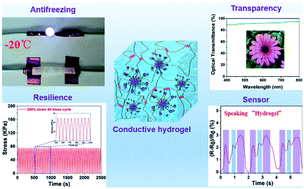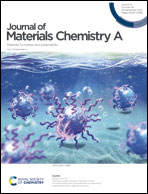Bioinspired, nucleobase-driven, highly resilient, and fast-responsive antifreeze ionic conductive hydrogels for durable pressure and strain sensors†
Abstract
Conductive hydrogels have drawn tremendous attention in flexible devices, soft robotics, and artificial intelligence. The integration of synergistic characteristics such as reliable resilience, high strain sensitivity, and excellent mechanical properties is still a great challenge in strain sensors. Inspired by the heterogeneous network structure of biological soft tissues, herein, a novel ionic conductive hydrogel was fabricated by the interconnection between a “soft” hydrogen bond cross-linked polymeric network and “rigid” domains cross-linked by double hydrogen bonding, hydrophobic interaction, and π–π stacking. The completely physically cross-linked hydrogel exhibited excellent stretchable property (680%) and great resilience (92.53%). Besides, owing to numerous free moving ions (Li+, Na+, and Cl−) in the system, the hydrogel possessed high sensitivity (GF = 3.12) and fast strain responsiveness (≤100 ms) in a broad temperature range (−20–25 °C). Moreover, the hydrogel displayed tunable electromechanical behavior with durable stability and anti-fatigue variations in resistance upon mechanical deformation such as the detection of various daily human activities, including the variations of the fingers, elbow and larynx, and, jogging. Therefore, this “soft and rigid” structure provides a feasible solution for fabricating a high-performance ionic conductive hydrogel, which has potential as a multi-functional sensor in wearable devices, artificial intelligence, and electric skins.



 Please wait while we load your content...
Please wait while we load your content...